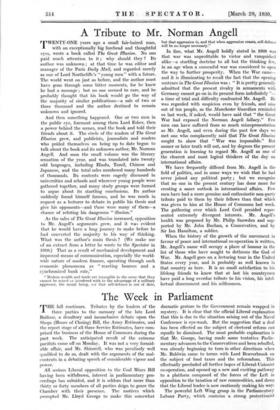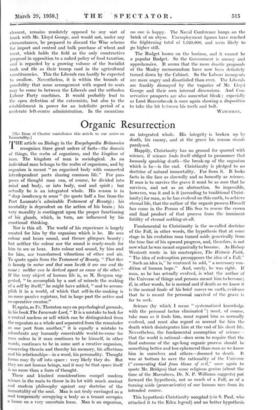The Week in Parliament
THE lull continues. Tributes by the leaders of the three parties to the memory of the late Lord Balfour, a desultory and inconclusive debate upon the Shops (Hours of Closing) Bill, the Army Estimates, and the report stage of all three Service Estimates, have com- prised the business of the House of Commons during the past week. The anticipated revolt of the extreme pacifists came off on Monday. It was not a very formid- able affair, and Mr. Shinwell, who was peculiarly well qualified to do so, dealt with the arguments of the mal- contents in a debating speech of considerable vigour and power.
All serious Liberal opposition to the Coal Mines Bill having been withdrawn, interest in parliamentary pro- ceedings has subsided, and it is seldom that more than thirty or forty members of all parties deign to grace the Chamber with their presence. The motives which prompted Mr. Lloyd George to make this somewhat dramatic gesture to the Government remain wrapped in mystery. It is clear that the official Liberal explanation that this is due to the situation arising out of the Naval Conference is eye-wash. But the suggestion that a deal has been effected on the subject of electoral reform can equally be dismissed. The most probable explanation is that Mr. George, having made some tentative Parlia- mentary advances to the Conservatives and been rebuffed, was already beginning to turn in other directions when Mr. Baldwin came to terms with Lord Beaverbrook on the subject of food taxes and the referendum. This effectually precluded all further hopes of Liberal-Unionist co-operation, and opened up a new and exciting pathway to a platform composed of the forces of the Left in opposition to the taxation of raw commodities, and down that the Liberal leader is now cautiously making his way.
The powerful Left Wing group in the Parliamentary Labour Party, which contains a strong protectionist element, remains resolutely opposed to any sort of truck with Mr. Lloyd George, and would not, under any circumstances, be prepared to discard the Wise scheme for import and control and bulk purchase of wheat and meat, which holds the field as the only constructive proposal in opposition to a naked policy of food taxation, and is regarded by a growing volume of the Socialist rank and file as their trump card in the agricultural constituencies. This the Liberals can hardly be expected to swallow. Nevertheless, it is within the bounds of possibility that some arrangement with regard to seats may be come to between the Liberals and the orthodox Labour Party machines. It would probably lead to the open defection of the extremists, but also to the establishment in power for an indefinite period of a moderate left-centre administration. In the meantime no one is happy. The Naval Conference hangs on the brink of an abyss. Unemployment figures have reached the frightening total of 1,620,000, and seem likely to go higher still.
The Budget looms on the horizon, and it cannot be 'a popular Budget. So the Government is uneasy and apprehensive. It seems that the more drastic proposals of the Mosley memorandum have now been definitely 'turned down by the Cabinet. So the Labour insurgents are more angry and dissatisfied than ever. The Liberals are frankly dismayed by the vagaries of Mr. Lloyd George and their own internal dissensions. And Con- servative prospects are also somewhat bleak ; especially as Lord Beaverbrook is once again showing a disposition to take the bit between his teeth and bolt.
WATCHMAN.















































 Previous page
Previous page